精读1第二版课后翻译整理
现代大学英语精读1课本内容及翻译
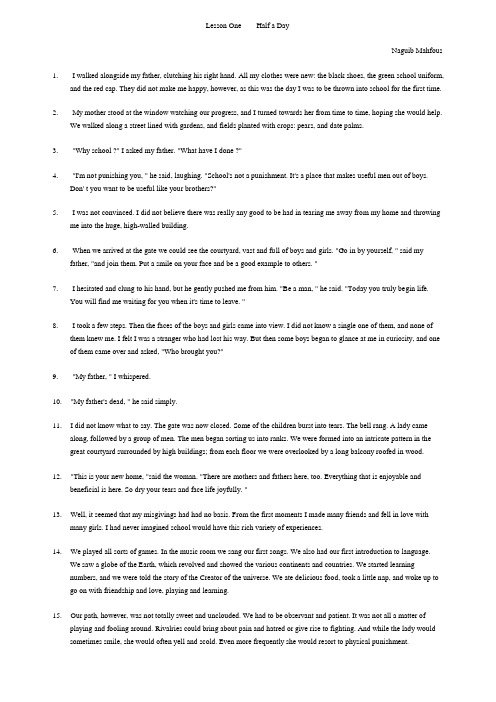
Lesson One Half a DayNaguib Mahfous1. I walked alongside my father, clutching his right hand. All my clothes were new: the black shoes, the green school uniform,and the red cap. They did not make me happy, however, as this was the day I was to be thrown into school for the first time.2. My mother stood at the window watching our progress, and I turned towards her from time to time, hoping she would help.We walked along a street lined with gardens, and fields planted with crops: pears, and date palms.3. "Why school ?" I asked my father. "What have I done ?"4. "I'm not punishing you, " he said, laughing. "School's not a punishment. It's a place that makes useful men out of boys.Don' t you want to be useful like your brothers?"5. I was not convinced. I did not believe there was really any good to be had in tearing me away from my home and throwingme into the huge, high-walled building.6. When we arrived at the gate we could see the courtyard, vast and full of boys and girls. "Go in by yourself, " said myfather, "and join them. Put a smile on your face and be a good example to others. "7. I hesitated and clung to his hand, but he gently pushed me from him. "Be a man, " he said. "Today you truly begin life.You will find me waiting for you when it's time to leave. "8. I took a few steps. Then the faces of the boys and girls came into view. I did not know a single one of them, and none ofthem knew me. I felt I was a stranger who had lost his way. But then some boys began to glance at me in curiosity, and one of them came over and asked, "Who brought you?"9. "My father, " I whispered.10. "My father's dead, " he said simply.11. I did not know what to say. The gate was now closed. Some of the children burst into tears. The bell rang. A lady camealong, followed by a group of men. The men began sorting us into ranks. We were formed into an intricate pattern in the great courtyard surrounded by high buildings; from each floor we were overlooked by a long balcony roofed in wood.12. "This is your new home, "said the woman. "There are mothers and fathers here, too. Everything that is enjoyable andbeneficial is here. So dry your tears and face life joyfully. "13. Well, it seemed that my misgivings had had no basis. From the first moments I made many friends and fell in love withmany girls. I had never imagined school would have this rich variety of experiences.14. We played all sorts of games. In the music room we sang our first songs. We also had our first introduction to language.We saw a globe of the Earth, which revolved and showed the various continents and countries. We started learningnumbers, and we were told the story of the Creator of the universe. We ate delicious food, took a little nap, and woke up to go on with friendship and love, playing and learning.15. Our path, however, was not totally sweet and unclouded. We had to be observant and patient. It was not all a matter ofplaying and fooling around. Rivalries could bring about pain and hatred or give rise to fighting. And while the lady would sometimes smile, she would often yell and scold. Even more frequently she would resort to physical punishment.16. In addition, the time for changing one' s mind was over and gone and there was no question of ever returning to theparadise of home. Nothing lay ahead of us but exertion, struggle, and perseverance. Those who were able took advantage of the opportunities for success and happiness that presented themselves.17. The bell rang, announcing the passing of the day and the end of work. The children rushed toward the gate, which wasopened again. I said goodbye to friends and sweethearts and passed through the gate. I looked around but found no trace of my father, who had promised to be there. I stepped aside to wait. When I had waited for a long time in vain, I decided to return home on my own. I walked a few steps, then came to a startled halt. Good Lord! Where was the street lined with gardens? Where had it disappeared to? When did all these cars invade it? And when did all these people come to rest on its surface? How did these hills of rubbish find their way to cover its sides? And where were the fields that bordered it? High buildings had taken over, the street was full of children, and disturbing noises shook the air. Here and there stood conjurers showing off their tricks or making snakes appear from baskets. Then there was a band announcing the opening of a circus, with clowns and weight lifters walking in front.18. Good God! I was in a daze. My head spun. I almost went crazy. How could all this have happened in half a day, betweenearly morning and sunset? I would find the answer at home with my father. But where was my home? I hurried towards the crossroads, because I remembered that I had to cross the street to reach our house, but the stream of cars would not let up.Extremely irritated, I wondered when I would be able to cross.19. I stood there a long time, until the young boy employed at the ironing shop on the corner came up to me.20. He stretched out his arm and said, "Grandpa, let me take you across."第一课半日1我走在父亲的一侧,牢牢地抓着他的右手。
《现代大学英语精读》(第二版)1课文翻译
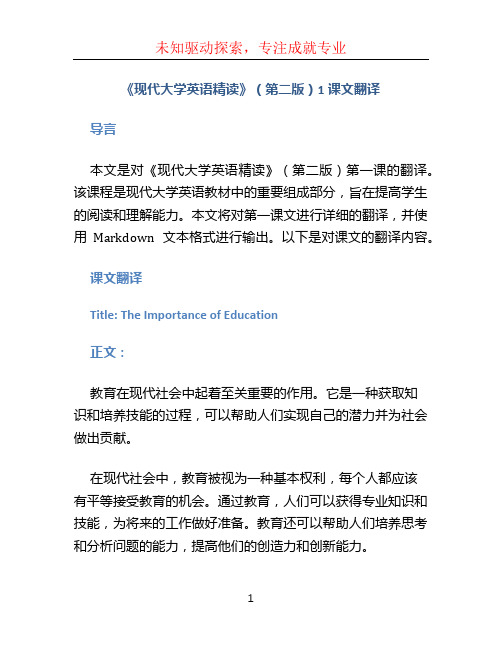
《现代大学英语精读》(第二版)1课文翻译导言本文是对《现代大学英语精读》(第二版)第一课的翻译。
该课程是现代大学英语教材中的重要组成部分,旨在提高学生的阅读和理解能力。
本文将对第一课文进行详细的翻译,并使用Markdown文本格式进行输出。
以下是对课文的翻译内容。
课文翻译Title: The Importance of Education正文:教育在现代社会中起着至关重要的作用。
它是一种获取知识和培养技能的过程,可以帮助人们实现自己的潜力并为社会做出贡献。
在现代社会中,教育被视为一种基本权利,每个人都应该有平等接受教育的机会。
通过教育,人们可以获得专业知识和技能,为将来的工作做好准备。
教育还可以帮助人们培养思考和分析问题的能力,提高他们的创造力和创新能力。
教育也对个人的发展和成长至关重要。
通过接受教育,人们可以发展出他们的潜能,掌握新的技能和知识,从而实现自我成长和进步。
教育可以帮助人们提高自信心,培养积极的态度,并为实现个人目标做好准备。
除了个人和社会的发展,教育还可以对整个国家的发展起到重要的推动作用。
一个教育水平高的国家往往更加繁荣和发达。
教育可以培养高素质的人才,提高国家的整体竞争力。
教育还可以帮助国家解决各种社会问题,促进社会和谐与稳定发展。
然而,尽管教育的重要性被广泛认可,但仍然存在一些挑战和问题。
例如,教育资源不平衡问题导致了教育机会的不公平分布。
一些地区和家庭可能缺乏适当的教育资源,导致教育的质量和效果不尽如人意。
此外,教育过程中的压力和竞争也对学生产生了巨大的压力,可能影响他们的身心健康。
为了解决这些问题,社会应该加大对教育的投入,提高教育资源的平衡性,并为学生提供更好的学习环境和条件。
同时,教育系统也需要不断改革和创新,以适应日益变化的社会和经济需求。
总的来说,教育是现代社会不可或缺的一部分。
它对个人的发展、社会的进步以及国家的发展都起着重要的作用。
我们应该重视教育,为每个人提供平等的教育机会,并共同努力建设一个更加公平和繁荣的社会。
现代大学英语精读1课本翻译0204192233

第一课半日1我走在父亲的一侧,牢牢地抓着他的右手。
我身上穿的,戴的全是新的:黑鞋子,绿校服,红帽子。
然儿我一点儿也高兴不起来,因为今天我将第一次被扔到学校里去。
2母亲站在窗前望着我们缓缓前行,我也不时的回头看她,希望她会救我。
我们沿着街道走着,街道两旁是花园和田野,田野里栽满了梨树和椰枣树。
3“我为什么要去上学?”我问父亲,“是我做错了什么了吗?”4“我不是在惩罚你,”父亲笑着说道,“上学不是一种惩罚。
学校是把孩子培养成才的地方。
难道你不想象你哥哥们那样,成为一个有用的人吗?”5我不相信他的话。
我才不相信把我从家里拽出来,扔进那个大大的,高墙围绕的建筑里对我有什么真正的好处呢。
6到了学校门口,我们看到了宽阔的庭院,站满了孩子。
“自己进去吧,”我父亲说,“加入他们。
笑一笑,给其他的孩子做个好榜样。
”7我紧抓着父亲的手,犹豫不决。
但是父亲却把我轻轻地推开了。
“拿出点男子气概来,”他说,“从今天起你就要真正开始自己的生活了。
放学时我会在这等你的。
”8我走了几步,便看见了一些孩子的面孔。
他们中我一个也不认识。
他们也没有一个认识我的。
我感觉自己像是一个迷了路的陌生人。
然而这时有些男孩开始好奇的打量我,其中一个走过来问到,“谁带你来的?”9“我爸爸”我小声说道。
10“我爸爸死了,”他简短地说。
11我不知道该说些什么。
这时学校的门已经关上了,有些孩子哭了起来。
接着,铃响了,一位女士走了过来,后面跟着一群男人。
那些人把我们排成几行。
使我们形成一个错综复杂的队行,站在那四周高楼耸立的院子里。
每层楼都有长长的阳台,阳台上带有木制顶棚,从阳台上可以俯视到我们。
12“这是你们的新家,”那位女士说道,“这儿有你们的父母。
一切能带给你们快乐,对你们有益的事物,这儿都有。
因此擦干你们的眼泪,快快乐乐地面对生活。
”13这样看来我之前的顾虑都是毫无根据的了。
从一开始我就结交了许多朋友,并且爱上了许多女孩。
我从未想过学校的生活是如此丰富多彩。
现代大学英语精读1课文翻译
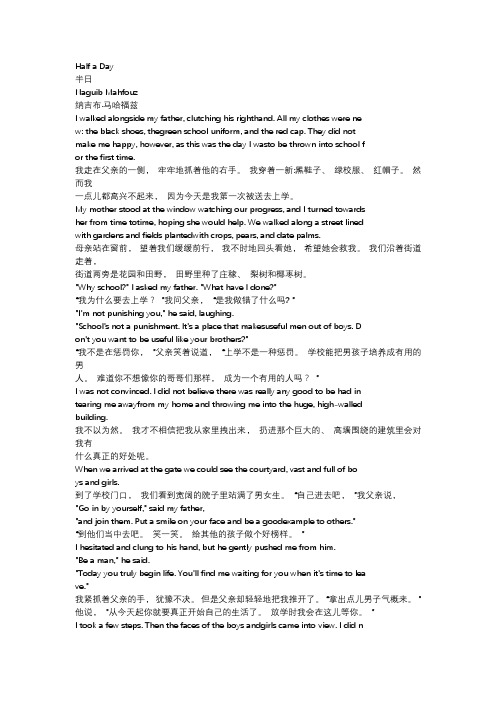
Half a Day半日Naguib Mahfouz纳吉布·马哈福兹I walked alongside my father, clutching his righthand. All my clothes were new: the black shoes, thegreen school uniform, and the red cap. They did notmake me happy, however, as this was the day I wasto be thrown into school for the first time.我走在父亲的一侧,牢牢地抓着他的右手。
我穿着一新:黑鞋子、绿校服、红帽子。
然而我一点儿都高兴不起来,因为今天是我第一次被送去上学。
My mother stood at the window watching our progress, and I turned towardsher from time totime, hoping she would help. We walked along a street linedwith gardens and fields plantedwith crops, pears, and date palms.母亲站在窗前,望着我们缓缓前行,我不时地回头看她,希望她会救我。
我们沿着街道走着,街道两旁是花园和田野,田野里种了庄稼、梨树和椰枣树。
"Why school?" I asked my father. "What have I done?"“我为什么要去上学?”我问父亲,“是我做错了什么吗? ”"I'm not punishing you," he said, laughing."School's not a punishment. It's a place that makesuseful men out of boys. Don't you want to be useful like your brothers?"“我不是在惩罚你,”父亲笑着说道,“上学不是一种惩罚。
现代大学英语精读1第二版8-16单元课后规范标准答案
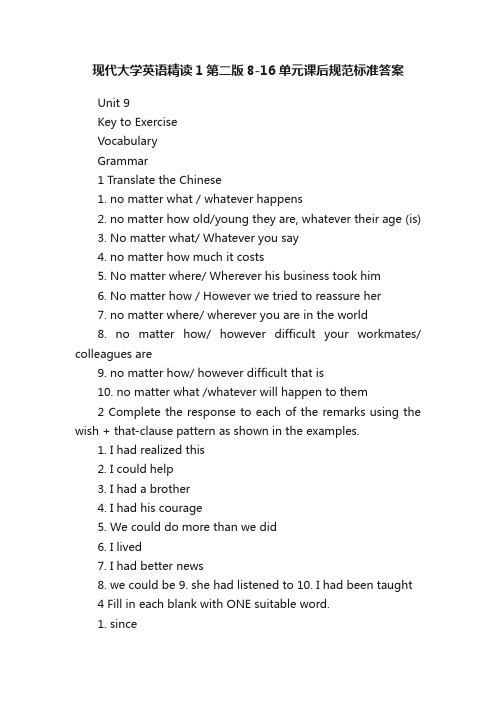
现代大学英语精读1第二版8-16单元课后规范标准答案Unit 9Key to ExerciseVocabularyGrammar1 Translate the Chinese1. no matter what / whatever happens2. no matter how old/young they are, whatever their age (is)3. No matter what/ Whatever you say4. no matter how much it costs5. No matter where/ Wherever his business took him6. No matter how / However we tried to reassure her7. no matter where/ wherever you are in the world8. no matter how/ however difficult your workmates/ colleagues are9. no matter how/ however difficult that is10. no matter what /whatever will happen to them2 Complete the response to each of the remarks using the wish + that-clause pattern as shown in the examples.1. I had realized this2. I could help3. I had a brother4. I had his courage5. We could do more than we did6. I lived7. I had better news8. we could be 9. she had listened to 10. I had been taught4 Fill in each blank with ONE suitable word.1. since3. popular4. idea/ practice5. relationships6. ways7. tradition8. among/ with9. longer 10. text5 Identify and correct the mistakes in each of the sentences1. This free copy is yours no matter whether/ if you buy any of our books. / This free copy is yours whether you buy any of our books or not.2. Wherever the people want us to go, we’d go there.3. In some ways we whish we could turn the clock back.4. On parting, the three of them decided to meet again at the same place in ten years.5. I wish my parents were as understanding as yours.6. The hotel treats its guests equally, no matter where they are from.7. His family and friends are all worried about him, for they haven’t heard from him for six weeks. / As his family and friends haven’t heard from h im for six weeks, they are all worried about him.8. All these years, I have kept track of the progress of the project.9. Toward 10 pm, the man in the doorway became anxious; he was not sure whether his friend would come. / Toward 10 pm, the man in the doorway became anxious, for he was not sure whether his friend would come.10. I wish the earthquake had never happened.Key to exerciseVocabulary2 Complete the following verb+noun collocations or expressions1. have / get / show / produce/ achieve the results2. have / take / accept / show / bear / assume responsibility3. discuss / debate / raise/ settle/ confuse / avoid issues4. pursue / have / develop hobbies5. have / make / lose / avoid contact6. save face / lives / time / money/ trouble7. remove roots / chairs/ hats / gloves / shoes / bandages / make-up/ doubts8. cultivate land / field / roses/9. eliminate enemies / rivals / opponents / suspects / errors10. produce oil / cars / cotton / results / a movie11. lack care / time / money / experience / patience / courage12. bury the dead / treasure / past / head13 nourish the plants / children / animals / relationship14. arrange meeting / appointments / time / place / flowers / business affairs Grammar4 Fill in the blank of the passage with ONE suitable word.1. comes2. different3. Anybody4. as5. longer6. burdens7. them8. who9. life 10. days5 Identify and correct the mistakes in each of the sentences.1. When Mandela no longer had to do manual labour, he started a garden in the yard.2. Medals enjoyed working in his garden because gardening offered him a sense of satisfaction in prison.3. He wants to pursue a career in journalism after graduation from college.4. They refused to discuss the matter in public.5. Neither his parents nor his friends thought he would become a writer.6. When he learned that he had been admitted by Tsinghua University, he could hardly wait to tell his family the news.7. We can meet either on campus or at my place.8. I was so absorbed in the story that I did not realize it was getting dark.9. I haven’t finished the book I’d borrowed from the library yet.10. Is it possible to arrange for me to work as a volunteer for the Landon Olympics? Unit 11Key to the exerciseVocabulary5 Fill in the blanks with the correct prepositions or adverbs.1 across, for, out 2. in search of 3. across/upon, out, from4. for, to5. upon, with6. to7. up, for, into8. through, into 9. at, with, in, toGrammar2 Rewrite the sentence by inverting the subject and main verb.1. Along a wall of the study stood three floor-length bookcases.2. It was midnight, but now and then, from the distance, came bangs of firecrackers.3. In a corner of the park lies the Tomb of the Unknown Soldier.4. Present at his 90th birthday party were people from all walks of life, along with over a hundred former students.5. Gone are the days when the big powers could order other countries about.4 Fill each blank of the passage with ONE suitable word.1. social2. typical3. have 4 depending 5. life6. cubs7. that8. trained9. on 10 such5 Identify and correct the mistakes in each of the sentences.1. The miners demanded that the accident be looked into.2. I was reading China Daily on the Internet when the light went out.3. We hurried to the stadium only to be told (that) the football game had been cancelled.4. It might be years before you can work your way up to the head of the department.5. The passengers had just fastened their seat belt when the plane began dipping wildly.6. It was quite some time before the boy could see everything around him clearly.7. On by training hard can an athlete hope to break a world record.8. In front of the bookshelves stood a desk on which pens and pieces of paper lay about.9. Where h ave you been? I’ve been looking for you the whole morning.10. In the 21st century, the computer is / computers are playing a more and more important role in our everyday life.Unit 12Key to the exerciseVocabulary4. Fill in the blanks with the correct form of the word in the brackets.1. simplified2. authorized, organize3. normalization4. industrialization, urbanized5. modernization, classified6. legalized, justified, civilized7. intensify, unification8. nationalized 9. notified, computerized 10. globalization, idealized3. Complete the following sentences1. a. success / luck b. I had more timec. I were ten years younger2. a. everybody is here b. are college studentsc. we have become one of the world’s largest economies3. a. we put environmental protection before GDPb. gave more attention to critical thinking4. a. the grammar exercisesb. helping you withc. help us with5. a. what the book says is always correctb. take it for grantedc. take it for granted6. a. say b. plan my time c. kiss/ thank, criticize7. a. like fish b. did go c. did smoke4. Rewrite the following sentences, replacing the parts in bold type with words and expressions from the text.1. strange2. to be bursting with3. the habit of… clung to him still, slipping into, ch eck4. can’t take anything for granted, take it for granted that we will be able5. Come to think of it6. But come to think of it / But now that I think about it7. Now that people all seem to have more money than before,I do hate, nowadays8. manage to (dig), Come to think of it9. but now that I am, will slip back easily in time5. Fill in the blanks with the correct prepositions or adverbs.1. in, in2. of, of, instead of3.with, to, as4. to, as5. Unlike, for6. in, off, of/about/with7. as, to, up 8. in with7. Fill in the blanks with the correct form or the words given below.1. worth2. worthwhile3. worthy4. worth5. now/nowadays6. now7. nowadays8. look 9.gaze 10. staring 11. glanced 12. glanced13. hay 14. wild herbs to eat 15. grass 16. weeds17. received, accepted 18. will accept 19. received20. lovely, beloved/loving 21. beloved 22. loving23. cry/ weep 24. crying 25. sobbingGrammar2. Complete the sentence using the proper conjunction from the box below.1. as if/ as though2. before3. as long as4. even though5. Even if6. now that7. as long as8. as if/ though9. Even though 10. Now that4. Fill in each blank of passage with ONE suitable word.1. smoke 2 what 3 teach 4 control 5 complaints6 group7 at8 could9 shared 10 more5. Identify and correct mistakes in each of the sentences1. At about three o’clock, the boy went to the barn and did the milking all by himself.2. Up until now there are still people who cling to the idea that men are superior to women.3. I think I locked the doors and closed the windows, but I’ll just go and make sure of them. ( or: …make sure I did.)4. It suddenly occurred to me that I had left my bike key in the classroom.5. Every one of us must arrive before 8 pm without exception.6. It’s important for young people to learn how to survive in the wild.7. It’s time our school upgraded its computer program.8. Robert woke up twenty times for fear that he would oversleep.9. Upon graduation, he was bursting with gratitude to the university for a first-class education he had received there.10. The teacher could hardly believe a student who grew up in a mountain village had never seen a computer before he came to college.Unit 13Key to the Exercise:Vocabulary:2 Translate the following phrases into English:1. uncork the bottle; undress the children; unearth the buried treasure; unpack the books from the box; uncover the dirty plan2. fulfill one’s wish/aspirations, fulfill one’s plan; fulfill /realize one’s dream; fulfill one’s promise; achieve the result;achieve independence; fulfill one’s demand; fulfill one’s expectations; achieve/ realize one’s purpose/aim/goal3. make progress; make inventions; make threats4. obey orders; obey the law; obey the authorities; obey the rules; obey the command; obey the leadership5. spread germs; spread the news; spread the map; spread the fire; spread the terror6. demand an explanation; demand a reply; demand an apology7. threaten life; threaten stability; threaten the economy; threaten the unity8. dominate/control th e world; dominate/control one’s life; dominate the match; dominate the family9. master a language; master art; master the new technology; masters kills/techniques3. Complete the sentences by translating the Chinese in the brackets according to the sentence patterns in bold.1. Once we all agree to regard our problems as differences among family members.2. Once you learn to look at the problem from the perspective of the opposite side.3. Once you get to know him better.4. what if we can’t find suitable jobs5. what if everybody decides to protect their home market6. what if we were hit by serious floods, droughts or earthquakes? What if the weather conditions were terrible and our harvests failed? What if there should be another serious energy crisis?7. If only he had kept at it.8. If only we had spent more money on the development ofagriculture9. If only he were still alive4 Rewrite the sentences replacing the parts in bold type with the words and expressions below.1. regard him as, turned out to be2. as it turned out later, carry out3. were capable of (destroying), call for4. keep at, spur them on5. appealed to her to think of6. depend on, get rid of7. were devoted to each other, but for8. different from, adapt to9. aims at (increasing)5. Fill in the blanks with the correct prepositions or adverbs1. from, to, out, in2. of, under3.for, off4. of, in 5 of 6 of, around, as7 of, to, to 8. to, to 9. to, forGrammar2 Study the use of as in the examples and complete each of the sentences using an appropriate verb from the box.1. accept2. described / regarded / thought of3. regard / see / think of4. introduced5. used6. treated /used7. regard / think of8. describe 9 regarded / thought of 10. described4 Fill in each blank of the passage with One suitable word.1 early2 locked3 rest4 but5 what6 words7 found8 frozen 9 working / operative 10 killed5. Identify and correct the mistake(s) in each of the sentences.1. Many men still have difficulty accepting a woman as a business partner.2. At the daycare center, the teachers treated the children as their own children. /At the daycare center, the teachers treated the children like mothers.3. The other day my father witnessed a terrible road accident in which two people were killed and three injured.4. There is always someone on campus to whom you can turn for advice. / There is always someone whom you can turn to for advice on campus.5. The movie is generally viewed as trash in spite of its box office success.6. He’s the kind o f person with whom many people feel uncomfortable.7. People tend to regard as the center of the world the place where/ in which they are born and brought up. / People tend to regard as the center of the world the place they are born and brought up in.8. Whether it is fine or it is rainy, they exercise every day.9. But for his help, I wouldn’t have been able to finish theproject in time.10. The computer is believed to be one of the most important inventions of the 20th century.Unit 15Key to the exerciseVocabulary2 Translate the following expressions into English1 wipe sweat2 sting one’s eye3 plough the field4 sow a cover crop5 produce good crops6 fell trees7 hunt squirrels8 bend one’s shoulders 10 fondle the clouds 11 rouse the curiosity12 cross the fence 13 clear a piece of land 14 fence the land15 smell the soft mud /dirt 16 think the same thought 17 take the trouble 18 make a narrow escape 19 thin the corn 20 mat the top3 Complete the sentences by translating the Chinese in the brackets following the example given1 prevent / keep/ stop government officials from abusing their power2 prevent /keep the children from entering his garden3 prevent /keep ordinary people from entering his garden4 not to drink and smoke any more5 not to build a big city here ever6 not to be content with what has been achieved.7 Isn’t it too risky for us8 Isn’t it too early for her9 Isn’t it too hard for you10 it was in this temple that Emperor Shunzhi of the Qing dynasty was supposed to secretly become a monk.11 it is not the place where the famous battle in history was fought12 it was not because of Qin Gui, but because of the then emperor that Yue Fei, the famous patriotic general of Southern Song dynasty was executed13 you would think that he knew everything14 you might take her for princess of a certain Arab country15 all these have happened in the past three decades5 Fill in the blanks with the correct prepositions or adverbs1 at, in2 up, up with3 about, down4 out of5 away from, on/over/across6 away/ off7 on, round, in, at8 up 9 toward, with, at, without, for, fromGrammar4. Fill in each blank of the passage with ONE suitable word.1. removed2. more3. followed4. however5. sorry6. let7. with8. leave9. wrong 10 silent5 Identify and correct the mistake(s) in each of the sentence.1. The joke had us all laughing outright.2. Parents shouldn’t force their children to do what they don’t like.3. These children are made to work 10 hours a day.4. Xiao Li’s gone to the barber’s to have his hair cut /…to have a haircut.5. At the end of the story, Maheegun, the wolf, returned to (the place) where he belonged—the wild. / At the end of the story, Maheegun, the wolf, returned to the place he belonged to –the wild.6. On Christmas morning, Rob got up an hour early and did the milking all by himself.7. It’s high time we gave our dorm room a spring-clean. / It’s high time to give our dorm room a spring-clean.8. Rob woke up several times to look at his watch for fear (that) he would oversleep.9. Don’t take it for granted that once you enter college you’re sure to succeed.10. Even if none of you go, I’ll be there rain or shine.Unit 16Key to ExerciseVocabulary3 Fill in the blanks with correct form of the word(s) in the brackets.1. honest, honestly, honesty2. ignorant, ignorance, ignorant3. discussion, exchange, argument, exchange4. justice, democracy, inclination, injustice, democracy2 Translate the following phrases into English1. wash the car ; park the car2. ride a bike; ride a horse3. water the flowers; water the lawn4. exchange a look; exchange a grin / smile5. get the same deal / have the same problem6. lighten the atmosphere7. keep distance9. point a finger at10. grab / seize / grasp/ grip one’s arm11 make a joke12. smash a window13. watch / observe the effect14. blanket / cover / envelop this place4 Fill in the blanks with the correct prepositions or adverbs.1. for, of, off, into2. up, out of, up, with, with, away3. on, at, by, by, under, in4. up, out5. from, on, of, on5 Complete the following sentences with appropriate expressions from the box blow1. might as well2. scared of, nothing of the sort3. watch out for / keep an eye on4. above suspicion5. talk us into6. anything, except/but, or something7. set foot in8. made up9. wise up, go by10. keep an eye on/watch out for。
现代大学英语精读1(第二版)unit 1语法学习整理版
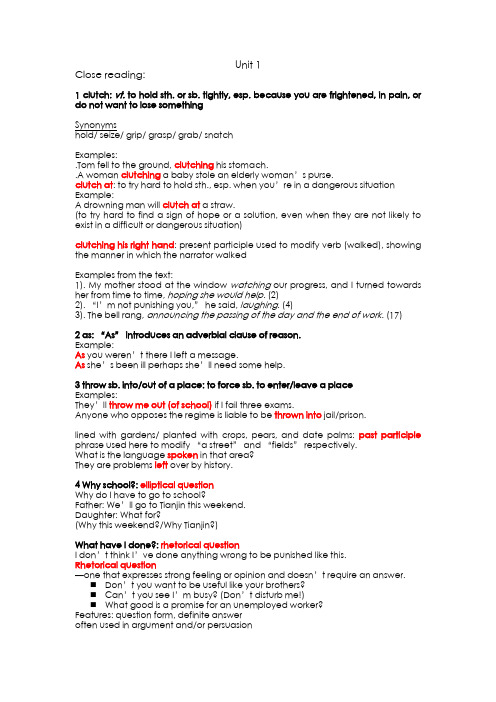
Unit 1Close reading:1 clutch: vt. to hold sth. or sb. tightly, esp. because you are frightened, in pain, or do not want to lose somethingSynonymshold/ seize/ grip/ grasp/ grab/ snatchExamples:.Tom fell to the ground, clutching his stomach..A woman clutching a baby stole an elderly woman’s purse.clutch at: to try hard to hold sth., esp. when you’re in a dangerous situation Example:A drowning man will clutch at a straw.(to try hard to find a sign of hope or a solution, even when they are not likely to exist in a difficult or dangerous situation)clutching his right hand:present participle used to modify verb (walked), showing the manner in which the narrator walkedExamples from the text:1). My mother stood at the window watching our progress, and I turned towards her from time to time, hoping she would help. (2)2). “I’m not punishing you,” he said, laughing. (4)3). The bell rang, announcing the passing of the day and the end of work. (17)2 as: “As” introduces an adverbial clause of reason.Example:As you weren’t there I left a message.As she’s been ill perhaps she’ll need some help.3 throw sb. into/out of a place:to force sb. to enter/leave a placeExamples:They’ll throw me out (of school)if I fail three exams.Anyone who opposes the regime is liable to be thrown into jail/prison.lined with gardens/planted with crops, pears, and date palms: past participle phrase used here to modify “a street” and “fields” respectively.What is the language spoken in that area?They are problems left over by history.4 Why school?: elliptical questionWhy do I have to go to school?Father: We’ll go to Tianjin this weekend.Daughter: What for?(Why this weekend?/Why Tianjin?)What have I done?: rhetorical questionI don’t think I’ve done anythin g wrong to be punished like this.Rhetorical question—one that expresses strong feeling or opinion and doesn’t require an answer.⏹Don’t you want to be useful like your brothers?⏹Can’t you see I’m busy? (Don’t disturb me!)⏹What good is a promise for an unemployed worker?Features: question form, definite answeroften used in argument and/or persuasion5 make… (out) of sb./sth.: to make sb./sth. become…The army made a man of him.Hardships help make a man of a boy.6 convince: vt. to make sb. feel certain that sth. is trueExamples:I couldn’t convince him of his mistake.I managed to convince them that the story was true.7there is no good/use to be had in doing sth. or it is no good/use doing sth.It’s no good crying over spilt milk.There is no good to be had in crying over spilt milk.tearing me away from /throwing me into: verbal noun as the object of the preposition1).We had difficulty in finding a parking lot.2). There’s no point in waiting.tear sb. away from: make sb. leave a placeCan’t y ou tear yourself away from the TV for dinner?8vast and full:adjective phrase modifies “the courtyard”1).There’s nothing wrong with the computer.2). Can you recommend some books easy for freshmen to read?3). It was a conference fruitful of results.Features: When used as an attribute modifier, adjective phrases are often placed after the noun.Cling(1)to hold tightly; to refuse to let go紧紧抓住或抱住e.g. The little girl clung to her mother. 小女孩紧紧抱住她的妈妈。
外教社大学英语精读1、2册课后翻译答案

外教社大学英语精读1、2册课后翻译答案第一册1:他这次考试失败使他意识到定期复习功课是多么重要。
He failed in the exam, which has made him realize the importance of reviewing his lessons regularly.2:请一定不要忘记离家前你父母对你说过的话。
Be sure not to forget what your parents said to you before you left home.3:我确信她的英语知识对这项工作来说是足够的。
I am sure her knowledge of English is adequate for the job.4:这篇文章的目的是告诉学生怎样培养良好的学习习惯。
The purpose of this article is to tell the students how to develop good study habits.5:在当今时代,人们越来越多地依赖计算机来解决各种各样的难题。
6:略读不仅帮助你对将要阅读的东西有所了解,还帮助你读的快些,提高你的阅读理解力。
7:有些人以为男孩子考试成绩总比女孩子好,然而,事实未必如此。
Some people think that boys…performanceon tests is always betterthangirls‟,that is not necessarily the case, however.8:即使智力一般的学生也可以通过改进学习习惯而成为优等生。
1:幸好附近有家医院,我们立即把他送到了那里。
Fortunately there was a hospital nearby and we took him there at once.2:胜利登上乔治岛后,船长向指挥部发了一份无线电报。
After succeeding in landing on George Island, the captain sent a radio message tothe headquarters by radio.3:他决心继续他的实验,不过这次他将用另一种方法来做。
现代大学英语精读第二版_第一册_课文翻译
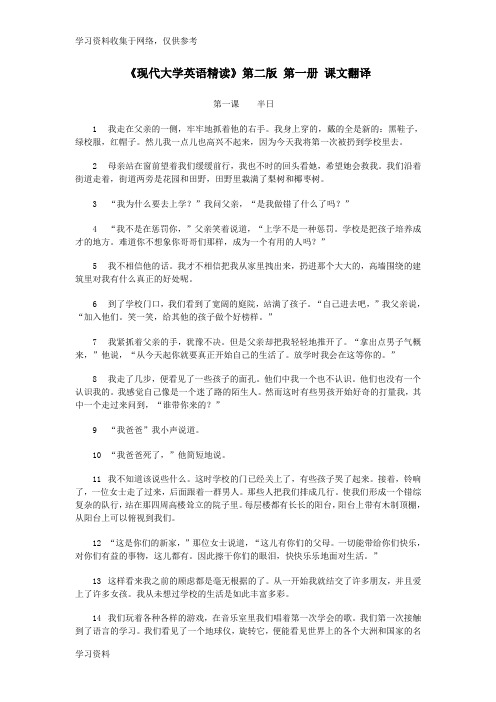
《现代大学英语精读》第二版第一册课文翻译第一课半日1我走在父亲的一侧,牢牢地抓着他的右手。
我身上穿的,戴的全是新的:黑鞋子,绿校服,红帽子。
然儿我一点儿也高兴不起来,因为今天我将第一次被扔到学校里去。
2母亲站在窗前望着我们缓缓前行,我也不时的回头看她,希望她会救我。
我们沿着街道走着,街道两旁是花园和田野,田野里栽满了梨树和椰枣树。
3“我为什么要去上学?”我问父亲,“是我做错了什么了吗?”4“我不是在惩罚你,”父亲笑着说道,“上学不是一种惩罚。
学校是把孩子培养成才的地方。
难道你不想象你哥哥们那样,成为一个有用的人吗?”5我不相信他的话。
我才不相信把我从家里拽出来,扔进那个大大的,高墙围绕的建筑里对我有什么真正的好处呢。
6到了学校门口,我们看到了宽阔的庭院,站满了孩子。
“自己进去吧,”我父亲说,“加入他们。
笑一笑,给其他的孩子做个好榜样。
”7我紧抓着父亲的手,犹豫不决。
但是父亲却把我轻轻地推开了。
“拿出点男子气概来,”他说,“从今天起你就要真正开始自己的生活了。
放学时我会在这等你的。
”8我走了几步,便看见了一些孩子的面孔。
他们中我一个也不认识。
他们也没有一个认识我的。
我感觉自己像是一个迷了路的陌生人。
然而这时有些男孩开始好奇的打量我,其中一个走过来问到,“谁带你来的?”9“我爸爸”我小声说道。
10“我爸爸死了,”他简短地说。
11我不知道该说些什么。
这时学校的门已经关上了,有些孩子哭了起来。
接着,铃响了,一位女士走了过来,后面跟着一群男人。
那些人把我们排成几行。
使我们形成一个错综复杂的队行,站在那四周高楼耸立的院子里。
每层楼都有长长的阳台,阳台上带有木制顶棚,从阳台上可以俯视到我们。
12“这是你们的新家,”那位女士说道,“这儿有你们的父母。
一切能带给你们快乐,对你们有益的事物,这儿都有。
因此擦干你们的眼泪,快快乐乐地面对生活。
”13这样看来我之前的顾虑都是毫无根据的了。
从一开始我就结交了许多朋友,并且爱上了许多女孩。
现代大学英语第二版精读1课文翻译Lesson twelve

Lesson Thirteen Christmas Day in the MorningPearl S. Buck1. He woke suddenly and completely. It was four o'clock, the hour at which his father had always called him toget up and help with the milking. Strange how the habits of his youth clung to him still! His father had been dead for thirty years, and yet he still woke at four o'clock in the morning. But this morning, because it was Christmas, he did not try to sleep again.2. Yet what was the magic of Christmas now? His childhood and youth were long past, and his own childrenhad grown up and gone.3. Yesterday his wife had said, "It isn't worthwhile, perhaps— "4. And he had said, "Yes, Alice, even if there are only the two of us, let's have a Christmas of our own."5. Then she had said, "Let's not trim the tree until tomorrow, Robert. I'm tired."6. He had agreed, and the tree was still out by the back door.7. He lay in his bed in his room.8. Why did he feel so awake tonight? For it was still night, a clear and starry night. No moon, of course, butthe stars were extraordinary! Now that he thought of it, the stars seemed always large and clear before the dawn of Christmas Day.9. He slipped back in time, as he did so easily nowadays. He was fifteen years old and still on his father's farm.He loved his father. He had not known it until one day a few days before Christmas, when he had overheard what his father was saying to his mother.10. "Mary, I hate to call Rob in the mornings. He's growing so fast, and he needs his sleep. I wish I couldmanage alone."11. "Well, you can't, Adam." His mother's voice was brisk, "Besides, he isn't a child any more. It's time he tookhis turn."12. "Yes," his father said slowly, "But I sure do hate to wake him."13. When he heard these words, something in him woke: his father loved him! He had never thought of it before,taking for granted the tie of their blood. Now that he knew his father loved him, there would be no more loitering in the mornings and having to be called again. He got up, stumbling blind with sleep, and pulled on his clothes.14. And then on the night before Christmas, he lay thinking about the next day. They were poor, and most of theexcitement was in the turkey they had raised themselves and in the mince pies his mother made. His sisterssewed presents, and his mother and father always bought something he needed, a warm jacket, maybe, or a book. And he always saved and bought them each something, too.15. He wished, that Christmas he was fifteen, he had a better present for his father instead of the usual tie fromthe ten-cent store. He lay on his side and looked out of his attic window.16. "Dad," he had once asked when he was a little boy, "What is a stable?"17. "It's just a barn," his father had replied, "like ours."18. Then Jesus had been born in a barn, and to a barn the shepherds and the Wise Men had come, bringing theirChristmas gifts!19. A thought struck him like a silver dagger. Why should he not give his father a special gift, out there in thebarn? He could get up earlier, creep into the barn and get all the milking done. And then when his father went in to start the milking, he'd see it all done.20. He laughed to himself as he gazed at the stars. It was what he would do, and he mustn't sleep too soundly.21. He must have waked twenty times, striking a match each time to look at his old watch.22. At a quarter to three, he got up and crept downstairs, careful of the creaky boards, and let himself out. A bigstar hung low over the roof, a reddish gold. The cows looked at him, sleepy and surprised. It was early for them, too.23. But they accepted him calmly and he brought some hay for each cow and then got the milking pail and thebig milk cans.24. He had never milked all alone before, but it seemed almost easy. He smiled and milked steadily, two strongstreams rushing into the pail, frothing and fragrant. The cows were behaving well, as though they knew it was Christmas.25. The task went more easily than he had ever known it to before. Milking for once was not a chore. It was agift to his father. He finished, the two milk cans were full, and he covered them and closed the milk-house door carefully, making sure of the latch. He put the stool in its place by the door and hung up the clean milk pail. Then he went out of the barn and barred the door behind him.26. Back in his room he had only a minute to pull off his clothes and jump into bed, before he heard his fatherget up. He put the covers over his head to silence his quick breathing. The door opened.27. "Rob! " his father called. "We have to get up, son, even if it is Christmas."28. "Aw-right," he said sleepily.29. "I'll go on out," his father said. "I'll get things started."30. The door closed and he lay still, laughing to himself. In just a few minutes his father would know. Hisdancing heart was ready to jump from his body.31. The minutes were endless—ten, fifteen, he did not know how many—and he heard his father's footstepsagain. The door opened.32. "Rob!"33. "Yes, Dad—"34. "You son of a—" His father was laughing, a queer sobbing sort of a laugh. "Thought you'd fool me, didyou?" His father was standing beside his bed, feeling for him, pulling away the cover.35. He found his father and clutched him in a great hug. He felt his father's arms go around him. It was dark, andthey could not see each other's faces.36. "Son, I thank you. Nobody ever did a nicer thing—"37. "It's for Christmas, Dad!"38. He did not know what to say. His heart was bursting with love.39. "Well. I guess I can go back to sleep," his father said after a moment. "No, come to think of it, son, I'venever seen you children when you first saw the Christmas tree. I was always in the barn. Come on!"40. He pulled on his clothes again, and they went down to the Christmas tree, and soon the sun was creeping upto where the star had been. Oh, what a Christmas morning, and how his heart had nearly burst again with shyness and pride as his father told his mother about how he, Rob, had got up all by himself.41. "The best Christmas gift I ever had, and I'll remember it, son, every year on Christmas morning, as long as Ilive."42. They had both remembered it, and now that his father was dead he remembered it alone: that blessedChristmas dawn when, along with the cows in the barn, he had made his first gift of true love. Outside the window now the stars slowly faded. He got out of bed and put on his slippers and bathrobe and went softly downstairs. He brought in the tree, and carefully began to trim it. It was done very soon. He then went to his library and brought the little box that contained his special gift to his wife, a diamond brooch, not large, but beautiful in design. But he was not satisfied. He wanted to tell her—to tell her how much he loved her.43. How fortunate that he had been able to love! Ah, that was the true joy of life, the ability to love! For he wasquite sure that some people were genuinely unable to love anyone. But love was alive in him; it still was.44. It occurred to him suddenly that it was alive because long ago it had been born in him when he knew hisfather loved him. That was it: love alone could waken love.45. And this morning, this blessed Christmas morning, he would give it to his beloved wife. He could write itdown in a letter for her to read and keep forever. He went to his desk and began: My dearest love.46. When it was finished, he sealed it and tied it on the tree. He put out the light and went tiptoing up the stairs.The stars in the sky were gone, and the first rays of the sun were gleaming in the east, such a happy, happy Christmas!第十三课圣诞节的早上1他猛然彻底醒了过来。
(完整版)现代大学英语精读1第二版。课后练习答案解析

120447932参考答案(Unit 1-8)Unit OneKey to ExercisePreview:1 True or false1F 2T 3F 4F 5T 6F 7T 8T 9T 10TVocabulary4。
Complete the sentences by translating the Chinese in the brackets1。
differ 2。
differently, different 3. difference4。
serious, serious, seriously 5。
seriousness, seriously polluted 6. Fortunately/ Luckily, pollution, seriously, pollute7。
attention 8。
attentively, attentive3 Fill in the blanks with the correct forms of the phrases and expressions.4 Translate the following sentences using words and expressions taken from the text.1。
他们利用我们求助无门的困境把我们公司接管了.They took advantage of our helpless situation and took over our company.2. 虽然我们面前仍有困难,但我肯定我们中国人有智慧靠自己实现国家的和平统一。
Although there are still difficulties ahead of us, I am sure that we Chinese people will have the wisdom to bring abou t the peaceful unification of our country on our own.3。
现代大学英语精读1第二课(第二版)

yellowish, darkish 2) in the manner of: foolish, childish, boyish,
womanish, snobbish 3) of a country, such as Irish, Polish, Finnish,
adv. used to emphasize how good sth. is, how bad sth. is, etc. Example: We’ve been so damn busy all day; I’m shattered.
WB T L E
To be continued on the next page.
I. Word Study
Lesson 4—The Boy and the Bank Officer
3. damn
damn well: used to emphasize how determined or sure you are about sth.
Example: I damn well will go, and I’d like to see anyone try and stop me!
WB T L E
To be continued on the next page.
I. Word Study
Lesson 4—The Boy and the Bank Officer
1. account
② on account of: because of sth. else, especially because of a problem or difficulties Example: He can’t run very fast on account of his injured leg.
现代大学英语精读1(第二版)1-10单元课文翻译
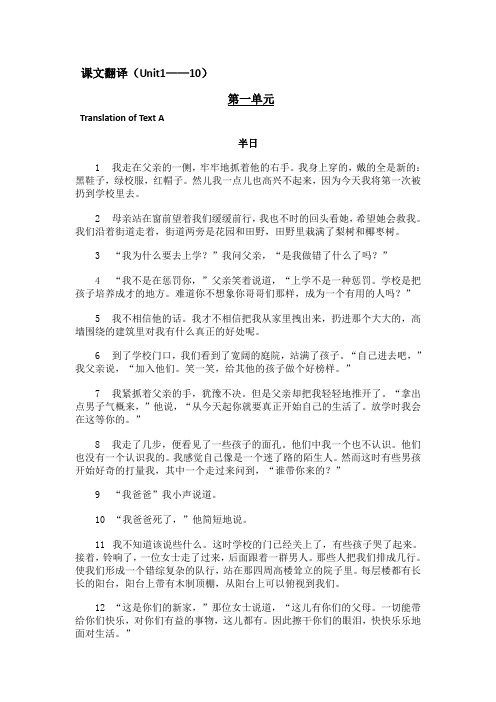
课文翻译(Unit1——10)第一单元Translation of Text A半日1我走在父亲的一侧,牢牢地抓着他的右手。
我身上穿的,戴的全是新的:黑鞋子,绿校服,红帽子。
然儿我一点儿也高兴不起来,因为今天我将第一次被扔到学校里去。
2母亲站在窗前望着我们缓缓前行,我也不时的回头看她,希望她会救我。
我们沿着街道走着,街道两旁是花园和田野,田野里栽满了梨树和椰枣树。
3“我为什么要去上学?”我问父亲,“是我做错了什么了吗?”4“我不是在惩罚你,”父亲笑着说道,“上学不是一种惩罚。
学校是把孩子培养成才的地方。
难道你不想象你哥哥们那样,成为一个有用的人吗?”5我不相信他的话。
我才不相信把我从家里拽出来,扔进那个大大的,高墙围绕的建筑里对我有什么真正的好处呢。
6到了学校门口,我们看到了宽阔的庭院,站满了孩子。
“自己进去吧,”我父亲说,“加入他们。
笑一笑,给其他的孩子做个好榜样。
”7我紧抓着父亲的手,犹豫不决。
但是父亲却把我轻轻地推开了。
“拿出点男子气概来,”他说,“从今天起你就要真正开始自己的生活了。
放学时我会在这等你的。
”8我走了几步,便看见了一些孩子的面孔。
他们中我一个也不认识。
他们也没有一个认识我的。
我感觉自己像是一个迷了路的陌生人。
然而这时有些男孩开始好奇的打量我,其中一个走过来问到,“谁带你来的?”9“我爸爸”我小声说道。
10“我爸爸死了,”他简短地说。
11我不知道该说些什么。
这时学校的门已经关上了,有些孩子哭了起来。
接着,铃响了,一位女士走了过来,后面跟着一群男人。
那些人把我们排成几行。
使我们形成一个错综复杂的队行,站在那四周高楼耸立的院子里。
每层楼都有长长的阳台,阳台上带有木制顶棚,从阳台上可以俯视到我们。
12“这是你们的新家,”那位女士说道,“这儿有你们的父母。
一切能带给你们快乐,对你们有益的事物,这儿都有。
因此擦干你们的眼泪,快快乐乐地面对生活。
”13这样看来我之前的顾虑都是毫无根据的了。
现代大学英语精读第二版课文翻译
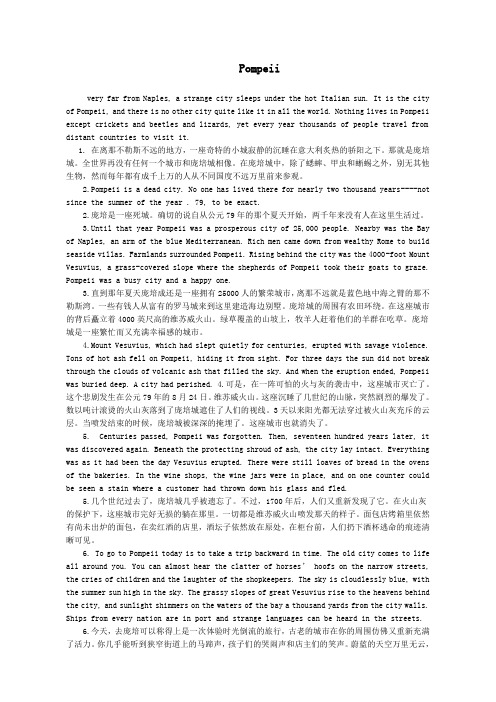
Pompeiivery far from Naples, a strange city sleeps under the hot Italian sun. It is the city of Pompeii, and there is no other city quite like it in all the world. Nothing lives in Pompeii except crickets and beetles and lizards, yet every year thousands of people travel from distant countries to visit it.1. 在离那不勒斯不远的地方,一座奇特的小城寂静的沉睡在意大利炙热的骄阳之下。
那就是庞培城。
全世界再没有任何一个城市和庞培城相像。
在庞培城中,除了蟋蟀、甲虫和蜥蜴之外,别无其他生物,然而每年都有成千上万的人从不同国度不远万里前来参观。
2.Pompeii is a dead city. No one has lived there for nearly two thousand years----not since the summer of the year . 79, to be exact.2.庞培是一座死城。
确切的说自从公元79年的那个夏天开始,两千年来没有人在这里生活过。
3.Until that year Pompeii was a prosperous city of 25,000 people. Nearby was the Bay of Naples, an arm of the blue Mediterranean. Rich men came down from wealthy Rome to build seaside villas. Farmlands surrounded Pompeii. Rising behind the city was the 4000-foot Mount Vesuvius, a grass-covered slope where the shepherds of Pompeii took their goats to graze. Pompeii was a busy city and a happy one.3.直到那年夏天庞培成还是一座拥有25000人的繁荣城市,离那不远就是蓝色地中海之臂的那不勒斯湾。
现代大学英语精读1 (第二版)Word_Study

Lesson 3-Message of the Land
I.
bully
Word Study
Translation
a local bully play the bully a bully idea a bully good dinner Bully for you! bullyboy
土豪 横行霸道, 横行霸道,恃强欺弱 绝妙的主意 极其丰盛的饭菜 干得好! 干得好! (受人雇佣且尤指与政治 集团有关的)流氓, 集团有关的)流氓,打手
rubbish garbage
Examples: The desk was littered with papers. I am tired of picking up litter thrown by other people. People who drop litter can be fined in some cities.
W
B
T
L
E
Lesson 3-Message of the Land
I.
Word Study
Word formations
5. insult v. to offend someone by saying or doing something they think is rude Examples: I hope Andy won't be insulted if I don't come. She insulted him by calling him a coward. You insult my intelligence with your crude methods! (= to say or do something that suggests you think someone is stupid)
现代大学英语精读1第二版第三单元课本学习知识翻译和课后规范标准答案
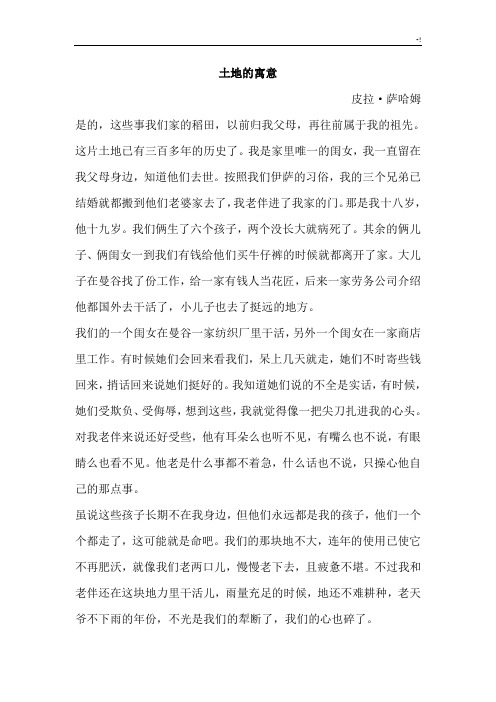
土地的寓意皮拉·萨哈姆是的,这些事我们家的稻田,以前归我父母,再往前属于我的祖先。
这片土地已有三百多年的历史了。
我是家里唯一的闺女,我一直留在我父母身边,知道他们去世。
按照我们伊萨的习俗,我的三个兄弟已结婚就都搬到他们老婆家去了,我老伴进了我家的门。
那是我十八岁,他十九岁。
我们俩生了六个孩子,两个没长大就病死了。
其余的俩儿子、俩闺女一到我们有钱给他们买牛仔裤的时候就都离开了家。
大儿子在曼谷找了份工作,给一家有钱人当花匠,后来一家劳务公司介绍他都国外去干活了,小儿子也去了挺远的地方。
我们的一个闺女在曼谷一家纺织厂里干活,另外一个闺女在一家商店里工作。
有时候她们会回来看我们,呆上几天就走,她们不时寄些钱回来,捎话回来说她们挺好的。
我知道她们说的不全是实话,有时候,她们受欺负、受侮辱,想到这些,我就觉得像一把尖刀扎进我的心头。
对我老伴来说还好受些,他有耳朵么也听不见,有嘴么也不说,有眼睛么也看不见。
他老是什么事都不着急,什么话也不说,只操心他自己的那点事。
虽说这些孩子长期不在我身边,但他们永远都是我的孩子,他们一个个都走了,这可能就是命吧。
我们的那块地不大,连年的使用已使它不再肥沃,就像我们老两口儿,慢慢老下去,且疲惫不堪。
不过我和老伴还在这块地力里干活儿,雨量充足的时候,地还不难耕种,老天爷不下雨的年份,不光是我们的犁断了,我们的心也碎了。
没,我们俩没怎么变,可我们的村子变了哪些地方变了?就在十年以前,我们还能以物换物,可如今都用钱了。
几年前,我们还能请街坊来帮忙盖房子、收割稻子或是打井。
这会儿,都得付钱,他们才肯帮忙。
塑料玩意替代了村里手工做的东西,以前男人们还做点竹器,可如今没人干了。
现在村里到处都是乱扔的塑料袋,一下子冒出来不少商店,里面放满了五颜六色的塑料玩意,还有些我们用不上的东西。
年轻人都去镇上和城里打工,留下我们这些老年人种地。
我知道年轻人跟我们老年人的想法不一样,他们说老年人思想落伍了。
大学英语精读1、精读2的课后练习翻译答案

大学英语精读1、精读2的课后练习翻译答案精读1Unit 1Translation1、他这次考试的失败使他意识到定期复习功课的重要。
His failure in the exam has made him aware of the importance of reviewinghis lessons regularly.2、请一定不要忘记离家前你父母对你说过的话。
Be sure not to forget what your parents said to you before you left home.3、我确信她的英语知识对这项工作来说是足够的了。
I'm sure her knowledge of English is adequate for the job.4、这篇文章的目的是告诉学生怎样培养良好的学习习惯。
The purpose of this article is to tell the students how to develop goodstudy habits.5、在当今时代,人们越来越多地依靠计算机(computers)来解决各种各样的问题。
In our age, people depend more and more on computers to solve various kinds of difficult problems.6、略读不仅可以帮助你对将要阅读的东西有所了解,还可以帮助你读得快些,提高你的阅读理解力。
Skimming not only helps you get some idea of what you are going to readbut also helps you read faster and improve your comprehension.7、有些人以为男孩子比女孩子聪明。
然而,事实未必如此。
Some people believe that boys are cleverer than girls. This is notnecessarily the case, however.8、即使智力一般的学生也可以通过改进学习习惯习惯而成为优等生。
新标准大学英语(第二版)综合教程 精读1 课后参考翻译
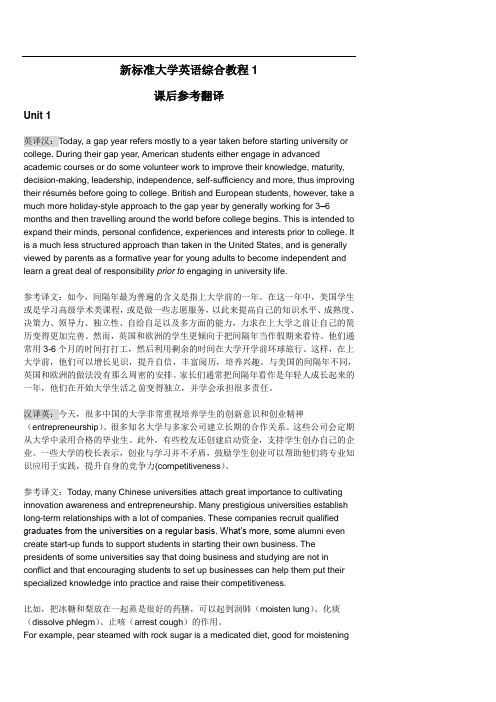
新标准大学英语综合教程1课后参考翻译Unit 1英译汉:T oday, a gap year refers mostly to a year taken before starting university or college. During their gap year, American students either engage in advanced academic courses or do some volunteer work to improve their knowledge, maturity, decision-making, leadership, independence, self-sufficiency and more, thus improving their résumés before going to college. British and European students, however, take a much more holiday-style approach to the gap year by generally working for 3–6 months and then travelling around the world before college begins. This is intended to expand their minds, personal confidence, experiences and interests prior to college. It is a much less structured approach than taken in the United States, and is generally viewed by parents as a formative year for young adults to become independent and learn a great deal of responsibility prior to engaging in university life.参考译文:如今,间隔年最为普遍的含义是指上大学前的一年。
精读1课后练习的词组和翻译

精读1课后练习的词组和翻译Unit 11.a useful word:一个有用的词2.a helpful suggestion:一条很有帮助的建议3.a painful experience:一次痛苦的经历4.a tearful voice:一个含泪的声音5.a hopeless war:一场无望的战争6.a priceless stone:一颗无价的宝石7.a useless book:一本无用的书8.a careful look:仔细一看9.an eventful year:一个多事的年份(多事之秋)10.a harmful habit:一个有害的习惯11.a harmless animal:一只对人无害的动物12.a shameless liar:一个无耻的撒谎者13.a classless society:一个无阶级的社会14.a hopeful situation:很有希望的形势15.a fruitful visit:一次富有成果的访问16.a powerful army:一支强大的军队17.a careless mistake:一个粗心的错误18.a homeless child:一个无家可归的孩子19.a toothless old man:一个牙齿已掉光的老汉20.a nameless flower:一朵无名的花1. They took advantage of our helpless situation and took over our company.他们利用我们求助无门的困境把我们公司接管了。
2.Although there are still difficulties ahead of us,I am sure that we Chinese people will have the wisdom to bring about the peaceful unification of our country on our own.虽然我们面前仍有困难,但我肯定我们中国人有智慧靠自己实现国家和平统一。
- 1、下载文档前请自行甄别文档内容的完整性,平台不提供额外的编辑、内容补充、找答案等附加服务。
- 2、"仅部分预览"的文档,不可在线预览部分如存在完整性等问题,可反馈申请退款(可完整预览的文档不适用该条件!)。
- 3、如文档侵犯您的权益,请联系客服反馈,我们会尽快为您处理(人工客服工作时间:9:00-18:30)。
Unit 14 Translate the following sentences using words and expressions taken from the text.1. 他们利用我们求助无门的困境把我们公司接管了。
They took advantage of our helpless situation and took over our company.2. 虽然我们面前仍有困难,但我肯定我们中国人有智慧靠自己实现国家的和平统一。
Although there are still difficulties ahead of us, I am sure that we Chinese people will have the wisdom to bring about the peaceful unification of our country on our own.3. 只强调国内生产总值是错误的,它会引起很多严重问题。
It is wrong to put emphasis on nothing but GDP. It will give rise to many serious problems.4. 他喜欢炫耀他的财富,但是这完全是徒劳的,人们仍然像躲避毒药那样躲避他。
He loves to show off his wealth, but this is all in vain. People still avoid him as though he were poison.5. 他不久就爱上了这个村子。
他决心和村民一起把这个地方变成一个花园。
He soon fell in love with the village and was determined to make it a beautiful garden together with other villagers.6. 我们必须花更多的钱来和全球气温上升作斗争。
另外,我认为我们还必须采用严厉的法律措施。
这不只是一个钱的问题。
We must spend more money fighting against global warming. In addition, we must resort to tough laws. It is not just a matter of money.7. 当警察到达学校的时候,学生和老师还在一种茫然不知所措的状态。
When the police arrive at the school, the students and the teachers were still in a daze.8. 这个腐败的官员还在死死抓住他的权力不放。
他拒绝靠边站。
This corrupt official was still clinging to his power. He refused to step aside.9. 当那个人最后进入视界时,我发现他原来是我父亲。
不知道他怎么在这大雪中找到这个地方的。
那时候,我放声大哭起来。
When the man finally came into view, I found it was my father. I didn‟t know how he managed to find this place in the blinding snow. At that moment, I burst into tears. 10. 她不时地偷偷朝他张望。
她发现自己第一次这样看一个年轻男子。
She glanced at him from time to time. It was the first time in her life that she had found herself looking at a young like that.4 Translate the following sentences into English1. 上大学之前,我没有想到大学生活如此丰富多彩。
Before I came to/ entered college, I had never thought life at college would be so rich and interesting.2. 出生于20世纪90年代的中国大学生大多数是独生子女。
Most of the Chinese college students born in the 1990s are the only child of their families.3.了解他的人都因为他出色的工作而钦佩他。
All those who know him admire him for his hard work.4. 我那天缺课了,因为我不知道课已提前到了周四。
I missed the class because I didn‟t know it had moved up to Thursday.5. 在某些国家,超重的人会受到一定的惩罚。
In some countries, those who are overweight will be punished one way or another. 6.在大火中失去家园的人们很快被安置到安全的地方。
Soon after the fire, those who had lost their homes were taken to a place of safety. 7. 再见面的时候,我们发现我们两人变化都很大。
When we met again, we found we both had changed a lot.8. 以李教授为首的专家们很快就会来帮助农民解决问题。
A team of experts headed by Professor Li will soon come and help farmers solve their problems.9.现在种着西红柿的那块地以往是荒地。
The field planted with tomatoes used to be wasteland.10.我们老师叫我们读像矛盾、巴金那样大师们写的作品。
Our teacher told us to read books written by such masters as Mao Dun and Ba Jin.Unit 26 Translate the following sentence into English1. 在我看来,这似乎不可能,但是其他所有人看起来都很有信心。
It seems impossible to me, but all the others looked very confident.2. 我们四下一望,没有一个仍然矗立的建筑物了。
地震似乎把一切的摧毁了。
We looked around. There wasn‟t a building standing in sight. The earthquake seemed to have destroyed everything.3. ---他这些日子里似乎情绪很低落,不知道为什么。
He looks to be in a low spirits. I wonder why.---我觉得那是因为他似乎学习上没有多少进步。
他怕被同学瞧不起。
I think it is because he doesn‟t seem to be making much progress in his studies. He is afraid of being looked upon by his classmates.4. ---你在找什么,迪克?WWhat are you looking for, Dick?---我好像把钥匙丢了。
真烦人。
I seem to have lost my key. How annoying!5. 如果你发现一个字在中间说不通,你就该查查字典。
这是掌握意思的唯一办法。
If you find a word that doesn‟t seem to make any sense in a sentence, you should look it up in the dictionary. That is the only way to learn to use a word.6. 他们继续争吵了几个钟头,两人似乎谁也不愿听对方的话。
我突然想起有人说过:“讨论是知识的交流,而争吵是无知的交换。
”They went on arguing for hours. Neither was willing to listen to the other. I suddenly remembered someone saying: “Discussion is an exchange of knowledge whilear gument is an exchange of ignorance.”7. 那里的形式似乎非常复杂,政府已答应进行认真调查。
The situation there seems quite complicated. The government has promised to look into it.8. 我爷爷似乎正在好起来,但是他任然需要有人照顾。
My grandpa seems to be getting better and better, but he still needs somebody to look9. 经济学家已经得出结论:危机似乎很快就要结束了,世界经济正在好转。
Economists have come to the conclusion that the crisis seems to be coming to an end. World economy is looking up.10.这次病后,我看了看我的银行账本。
使我伤心的是,账上的余额几乎是零。
我前三年存在银行的钱全花完了。
When I got well I looked at my bank account. To my sadness, I found my balance was almost zero. All my sayings in the past three years were gone.4 Translate the following sentence using one of the patterns listed in Grammar exercise 1-21. 你还是试一试别的方法吧。
